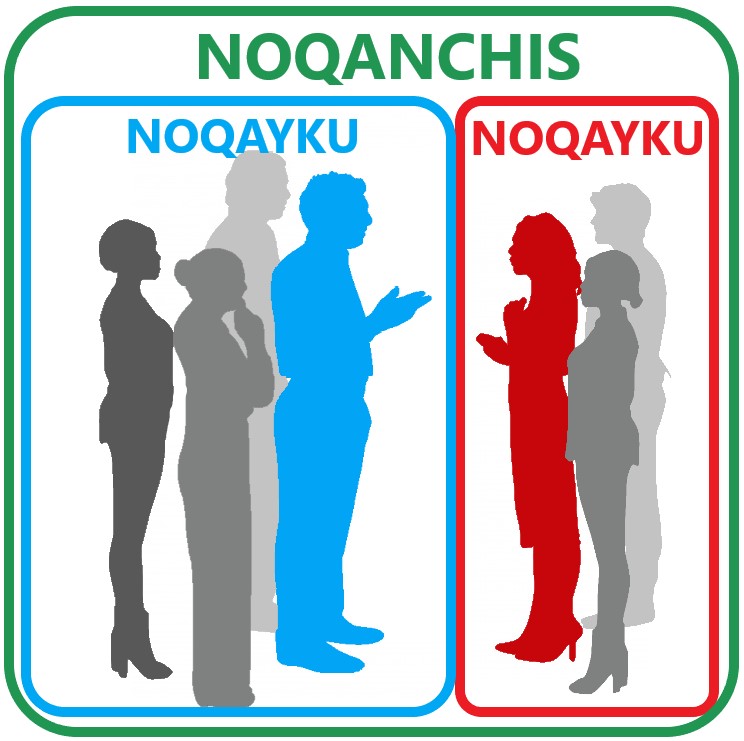Now that you know the pronunciation of Quechua consonants, let’s talk about the language itself. Let’s start with personal pronouns.
| Noqa | I |
| Qan | You |
| Pay | He / She |
| Noqanchis | We (including the addressee[s], including) |
| Noqayku | We (not including the addressee[s], excluding) |
| Qankuna | You [plural] (you guys, you people, you all) |
| Paykuna | They |
In some areas “Ñ” is used in the first singular and plural person: Ñoqa, Ñoqanchis and Ñoqayku, it is totally valid, there is no difference in meaning.
As you can see, unlike English, in Quechua there are 2 ways to express the pronoun “We“, in which case to use each one? This image shows us how each one works:

The image alone will not make you understand the concept, but with the following explanation I think so.
1. Noqayku: We (excluding)
It is called excluding because the addressee or addresses are excluded from the action or situation that is being discussed. This “We” means “me and him/her/them without you“
To know in which situation you have to use noqayku you have to identify the 2 groups that participate in a conversation: teller(s) and addressee(s). Let’s see some examples:
Me and him/her/them without you
Imagine 2 strangers who are visiting the Nazca Lines, then they start a conversation so he asks her: “And your family, where are they from?”, She replies: “We are from Cusco.”
Note that there are 2 groups in the situation: 1) she and her family and 2) her conversational partner. And although her family is not with her at that time, when she says “we“, she refers to her and her family (me and them), but not to her addresses.
Me and him/her/them without you guys/you people/you all
Now imagine a meeting of childhood friends who had not seen each other for many years, each one is accompanied by their spouse and even their children, they are in a recreational area outside the city. Then at lunchtime they are talking pleasantly, so each one begins to tell where they are living: “We live in Arequipa”, “We in Lima”, “We in Cusco”, etc.
In this example it can be seen that each one of those who speak does so on behalf of his group (family) excluding his addressee: “We (me and my family, but not you people) live in Arequipa”.
2. Noqanchis: We (including)
It is called inclusive because the addressee or addresses are included in the action or idea of the sentence. This “We” means “me and you/you guys” and “us and you/you guys”.
Me and you
Imagine that a woman talks to her son, wants to teach him to be grateful and says: “We must be grateful,” or the father may have traveled and the son asks his mother when he arrives, she replies: “We will see your father very soon. “
In both situations there are only 2 individuals, the teller and her addressee, you can see that the addressee is included in the action or in the situation, in those cases noqanchis is used.
Me and you guys/you people/you all
Imagine the previous examples, but instead of the mother speaking with only one of her children, she is speaking with several of them, and she says them the same things, this time, when she says “we” means “me and you all” . You also have to use noqanchis.
Us and you/you guys
Now imagine that a father, a mother and their only child are talking, both the father and the mother are talking with their son, then the father says to his son: “We are a family with good values.”
So when the father says “we” it is understood that he speaks on behalf of him and his wife, and is also including the child.
I hope this explanation has been useful to you, if you have any questions, leave it in the comments, so we all learn. You can also read this Wikipedia article where the topic is discussed a bit.
In the next grammar lesson you will learn to conjugate verbs in the present simple, however, before moving on to that lesson I recommend you learn some vocabulary, for example: basic verbs and the family in Quechua, so you can understand the examples we will use.

First time I’ve seen these two different types of “we” in a language. Fascinating!
Isn’t it?